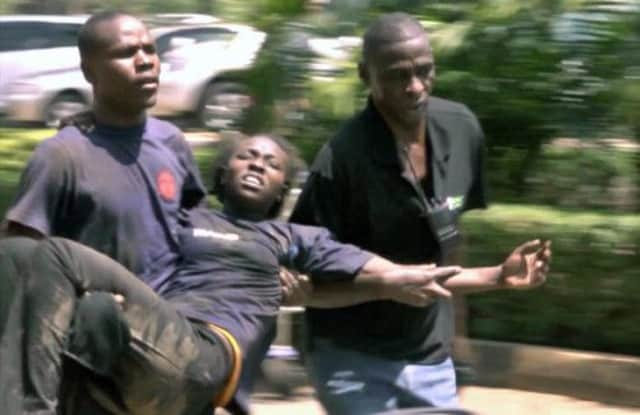Kenya terror survivors tell of lethal ‘trivia quiz’


As civilians hid, the assailants began a high-stakes game of 20 Questions to separate Muslims from “infidels”.
Witnesses have described how a 14-year-old boy saved himself by jumping off the mall’s roof, after learning from friends inside that they were quizzed on names of the Prophet Muhammad’s relatives.
Advertisement
Hide AdAdvertisement
Hide AdA Jewish man scribbled a Koran scripture on his hand to memorise, after hearing the terrorists were asking captives to recite specific verses. Numerous survivors described how the attackers from al-Shabaab, a Somali cell which recently joined al-Qaida, shot people who failed to provide the correct answers.
Their accounts, combined with internal al-Shabaab documents found this year, show the transformation within the global terror network, which began to rethink its approach after its setbacks in Iraq. Al-Qaida has since realised that the indiscriminate killing of Muslims is a strategic liability, and hopes instead to create a schism between Muslims and everyone else.
Rutvik Patel, 14, was at Nakumatt, the mall’s supermarket, when he heard the first explosion. “They started shooting continuously, and whoever died, died,” he said. “Then it became calm and they came up to people and began asking them some questions. If you knew the answer, they let you go,” he said. “They asked the name of the Prophet’s mum. They asked them to sing a religious verse.”
Just across from the supermarket, a 31-year-old Jewish businessman, inside the local Barclays, heard the shooting. The people there shut themselves in the room with the safe, switching off the lights. They learned, via texts, that the extremists were asking people to recite an Arabic prayer.
“One of the women who was with us got a text from her husband saying, they’re asking people to say the Islamic oath, and if you don’t know it, they kill you,” said the businessman.
He threw away his passport. Then he downloaded the Arabic prayer and wrote it on his palm.
“What this shows is al-Qaida’s acknowledgment that the huge masses of Muslims they have killed is an enormous PR problem within the audience they are trying to reach,” said Daveed Gartenstein-Ross, director of the Centre for the Study of Terrorist Radicalisation.
Until the Westgate attack, the group made no effort to spare Muslim civilians.
Advertisement
Hide AdAdvertisement
Hide AdAl-Shabaab’s evolution is reflected in three documents believed to be written by the terror group, and found in Mali this year. They include minutes of a conference of 85 Islamic scholars, held in December 2011 in Somalia, plus a summary of fatwas they issued last year after acceptance into the al-Qaida fold.
Baptised with the name al-Shabab, meaning The Youth, in 2006, the group began as an extremist militia, fighting the government of Somalia. As early as 2009, it began courting al-Qaida, issuing recordings with titles such as, “At Your Service Osama”.
Osama bin Laden refused to allow al-Shabaab into the al-Qaida network, according to letters retrieved from his Pakistan safehouse. The letters show the terror leader was troubled by regional jihadi operations killing Muslim civilians.
In a letter to Shabab in 2010, bin Laden advised the Somali-based fighters to review their operations “in order to minimise the toll to Muslims”. Shabab did not get the green light to join al-Qaida until February 2012, almost a year after bin Laden’s death.
New arrests
Kenya’s security services made another arrest yesterday in connection with the Westgate mall attack.
Kenya has arrested 12 people but three have been freed, Interior Minister Joseph Ole Lenku said in a press conference. He declined to say if any of the arrested were in the mall during the attack.
Investigators have also identified a car used by the gunmen, from al-Shabaab, and found in it “an assortment of illegal weapons,” said Lenku.
Kenyans have become frustrated over the government’s unwillingness to share information about the attack. Almost no details have been released about what happened after the first hours of the siege.
Advertisement
Hide AdAdvertisement
Hide Ad“We ask you to bear with us,” he said, of the government’s unwillingness to share information.
While the mall was a chaotic scene for hours, with people moving in and out of the upscale shopping centre, Lenku insisted no terrorists could have escaped.
“Our forces sealed off every point of exit,” he said. “It was completely secured.”